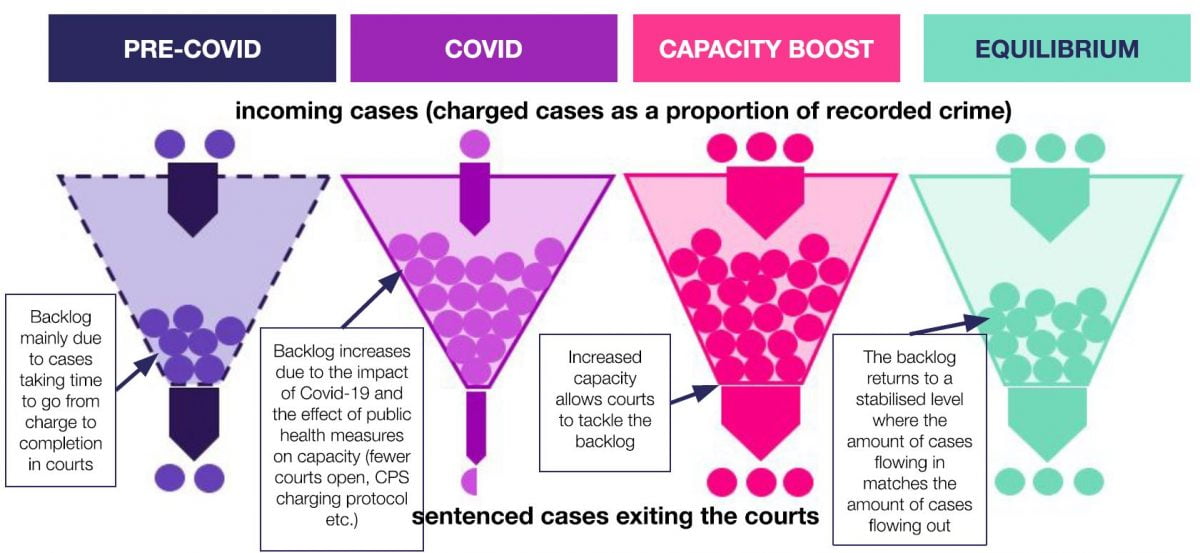Public support for remote court hearings
More than half of people would rather see offenders electronically tagged and ordered to serve community sentences than jailed for short periods of time, according to a new survey commissioned by Crest Advisory published last weekend which made an impact in the Sunday papers. The poll, conducted by YouGov, also found strong public support for some crimes to be reported online instead of in-person or over the phone, with a significant number in favour of virtual court hearings. The findings are contained in Crest’s new report which sets out the challenges facing the criminal justice system in England and Wales following the Covid-19 pandemic and explains why radical reforms are needed.
The report, “Survive. Recover. Rebuild. Justice post Covid-19”, calls for investment to clear a growing backlog of court cases; more use of diversion schemes, as an alternative to prosecution; and devolving prison and probation budgets to Metro Mayors.
Crest modelling suggests that the drive to recruit an extra 20,000 police officers will lead to more arrests and more prosecutions, adding to a backlog of court cases which has grown during the pandemic.
By 2024, the backlog will be “unmanageable”, with a four-fold increase in Crown Court cases, compared to 2019, and 10 times as many cases in Magistrates’ Courts, according to the analysis, first published in October.
Given the prospect of further lengthy delays, Crest gauged whether there was public support for radical measures to reduce waiting times and streamline the system.
Of the 1,663 adults in England, Scotland and Wales who were surveyed:
-
52% said they would “strongly” or “tend to” support the use of community sentences with electronic tagging as an alternative to prison terms of six months or less – with 24% against the idea.
-
54% back online crime reporting for some types of offences
-
43% are in favour of holding court hearings virtually – but 27% are opposed
-
34% support carrying out probation visits remotely for lower-risk offenders, with 35% against.
However, there was reluctance to support more fundamental changes to the court system. When asked about removing access to a jury trial for certain offences, 47% said they felt “very” or “fairly uncomfortable” at the prospect, 28% were “comfortable” with it while 25% said they did not know.
Crest concluded from its modelling that capacity in the system would have to double in order to stabilise the backlog. Since then, the government has pledged £275m per year to help bring it under control, but Crest estimates that about £400m will be needed – alongside far-reaching reforms.
Recommendations
The report contains five core recommendations to survive the crisis, recover and rebuild the criminal justice system:
Survive
1. The CJS needs a bailout to increase capacity, coping with the combined pressure of the pandemic and police officer uplift. The additional funding already pledged in October’s Spending Review (equivalent to a 1% increase in MoJ’s revenue expenditure) is a start but unlikely to be enough.
Recover
2. Ramping up capacity won’t be enough on its own – there is also a need to reduce demand coming in the ‘front end’. So, the Ministry of Justice and Home Office should set out a joint strategy to strengthen the use of diversion for low-level offenders.
3. At the same time, there is a need to reduce demand on the prison population, which is projected to grow under all scenarios.
Rebuild
4. In order to drive a more integrated approach, the MoJ should return to the ‘justice devolution’ agenda, which has been allowed to wither on the vine since 2016 – piloting devolution of prison and probation budgets to Metro Mayors, which will enable pooling of budgets and joint priorities.
5. There is a need for more rigorous accountability to drive up standards across the CJS. The government should revive the Courts Inspectorate and task the new ‘National Crime Lab’ with setting standards for more effective use of technology in the CJS.









